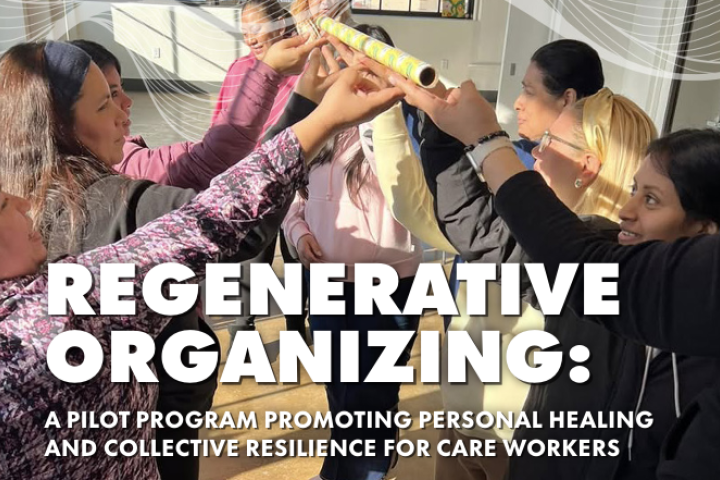
Worker Centered Economic Recovery : Labor in the 21st Century National Conference
After over a year of this global pandemic, there is finally an end in sight for most Americans. But when the dust clears, all communities will be forced to reckon with the damage caused by the COVID-19 crisis. Unfortunately, the virus is not solely responsible for the pain and fear working people lived with through mass unemployment. Rather, the pandemic and its unequal impact made existing inequality more obvious.
Since the World Health Organization declared the COVID-19 pandemic in March of last year, stark indications of existing inequalities persist, with uneven impacts based on income, gender, occupation, and race. Data from the Economic Policy Institute indicate that unemployment rates have increased for Black and Hispanic workers as they continue to face a disproportionate share of the pandemic’s economic and health burdens. Furthermore, the fallout from the pandemic is pushing pre-pandemic inequality even higher. Since March of last year, the billionaire class in the United States added $1.3 trillion to their total wealth, clocking in at a combined net wealth of $4.2 billion.
It is safe to say that workers today are faced with the most extreme levels of inequality in the last 100 years. As we begin to consider what a post-pandemic future looks like in the United States, the labor movement must work together to develop strategies for ensuring a worker-centered economic recovery. On March 26th, as part of the 75th anniversary celebrations for the ILR School, the Worker Institute hosted a conference with labor leaders across the country to discuss best practices for prioritizing the needs of working people.
Economic recovery after the pandemic will require a complex and multi-faceted set of interventions. This event focused on three key strategies: reducing the power of financial and corporate elites, advancing racial and gender justice, and attacking climate change by creating good jobs and income security. The panel featured Lisa Donner, Executive Director, Americans for Financial Reform, Doug Moore, Executive Director of the United Domestic Workers of America (UDW/AFSCME 3930), and Rick Levy, President, Texas AFL-CIO. It was moderated by Rosemary Batt, Alice Hanson Cook Professor of Women and Work at the ILR School.
Donner explained the complexities of righting the wrongs in our current financial system. Most of us can recognize the most egregious of the exorbitantly wealthy, such as Jeff Bezos and Elon Musk. These high-profile business owners and leaders are not the only actors benefiting from and contributing to income inequality. Instead, insidious forces that oftentimes go unnoticed in the public discourse such as private equity deserve just as much attention.
One of the most significant strategies discussed was the Stop Wall Street Looting Act. This would close tax loopholes that allow corporate interests to plunder state and local governments, offering alternatives to a system that for too long has been rigged against workers. Public investment banks, funding to develop critical infrastructure, and supplementing direct federal financial investments are all first steps included in the legislation that would significantly shift power away from private interests and into communities.
Rick Levy sees climate change as being inextricably linked to the crisis of inequality. Texas is both on the frontline of the climate crisis and is home to the highest percentage of uninsured people in the country – a product of the economy’s current structure that exacerbates the transfer of wealth from the have-nots to the haves. Levy explained that in order to put an end to these extractive practices, the labor movement must be willing to have hard conversations with members. The Texas AFL-CIO has succeeded in this effort by building rank-and-file councils in particularly conservative areas to educate members on how climate change, systemic racism, and healthcare inequalities impact their daily lives.
Batt and Donner explained that while private equity and union organizing may be diametrically opposed in principle, 35 percent of private equity’s holdings are from pensions. Under the Trump Administration, the power that divestment movements have over oil and gas industries was intentionally undercut with the adoption of the ESG Rule – legislation that prevented pension funds from divesting due to environmental, social and governance (“ESG”) factors. In a positive turn of events, the Biden Administration recently declared that they will not enforce the Trump ESG Rule, thus laying the foundation for the labor movement to leverage their financial holdings within powerful institutions contributing to much of the inequality discussed above. While the ball is now in sustainability’s court, unions members must collectively mobilize to prioritize long term interests in sustainability and economic justice.
The panelists discussed a broad range of strategies to address income inequality, as a core component of post-COVID economic recovery. By placing the communities most impacted by inequality, climate change, and COVID front and center, we can begin the process of bringing invisible communities into the light. Per Doug Moore, you can’t recover what you cannot see. Whether it’s care workers or domestic labor, these workers provide critical services to our communities. By investing in our workers, we can build lasting organizational infrastructure that centers the leadership of the rank-and-file and address inequality in this country.



